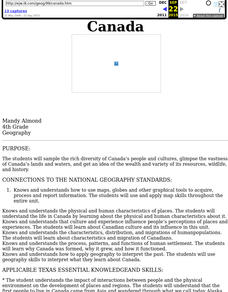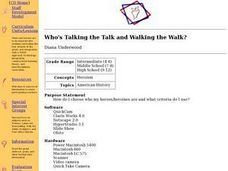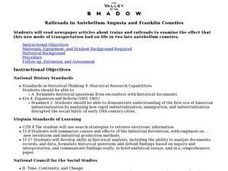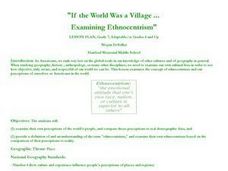Curated OER
Lorena Ochoa
In this famous leaders worksheet, students read a passage about Lorena Ochoa and then complete a variety of in-class and homework activities to support comprehension, including partner interviews, spelling, cloze, synonym...
Curated OER
Social Studies: Bombing of Hiroshima
Students read a first person account of the bombing of Hiroshima written by a Japanese physician. By reading Michihiko Hachiya's journal, they discover the fatalities caused by the bomb itself and later by radiation poisoning. To...
Curated OER
Who Were the Dissidents?
Young scholars discover how Japanese dissidents spoke out against the injustice practiced in Imperial Japan. In this Japanese history lesson, students listen to a lecture about the silent dissidents in the nation prior to World War II...
Curated OER
History in the Making
Students create and perform a skit that demonstrates the historical period and foriegn policy of a particular president. They first complete a diagram of George Washington's presidency as a class and then form small groups to research...
Curated OER
Keeping Our Food Safe
Learners learn about bacteria and how it is all around us on people and on surfaces. Students develop an understanding of the correct hand washing technique to ensure their cleanliness. Learners demonstrate exactly how to wash their...
Curated OER
Canada
Fourth graders sample the rich diversity of Canada's people and cultures, glimpse the vastness of Canada's lands and waters, and get an idea of the wealth and variety of its resources, wildlife, and history.
Curated OER
Predicting Lunar Eclipses
Students explore lunar eclipses and discover how to predict an eclipse the same way that ancient people did. They examine dates of recorded eclipses and find a pattern. Students apply an algorithm to the pattern.
Curated OER
Who's Talking the Talk and Walking the Walk?
Students discover the characteristics that make a hero or heroine. They also look at how society recognizes its heroes and how the nation represents its values and beliefs by researching heroes from the past and present.
Curated OER
Natural Disasters
Ninth graders write a description of a natural disaster. They list as many natural disasters as they can think of. The class discusses any natural disasters individuals have witnessed first hand. They watch a brief clip of a film that...
Curated OER
Westward Expansion - Fur Trade
Young scholars complete a unit of lessons to learn how products reach the market and study the history of the fur trade. In this history and trade lesson plan, students first learn about the technology that allowed products to reach...
Curated OER
Manifest Destiny and Westward Expansion
Students discover how manifest destiny and westward expansion are related. Using the Internet, they research the beginnings of the movement of manifest destiny and how it influenced people moving westward. They discuss the expectations...
Curated OER
Railroads in Antebellum Augusta and Franklin Counties
Eleventh graders are divided up into groups and work on separate worksheets. They reassemble as a class and discuss the different articles and how the railroads affected people's lives.
Curated OER
THE FABLE OF THE FAINTING GOATS
Students practice telling time while reading a story about a fainting goat. They write their own story about a fainting goat. Students write letters to the International Fainting Goat Association, asking for more information about...
Curated OER
Should Hate Be Outlawed?
Students investigate hate crime legislation. In this hate crime lesson, students examine the St. Paul city ordinance that outlawed hate crimes. Students explore the fine between hate crime legislation and First Amendment rights.
Curated OER
Win or Lose?
Pupils consider how the first supercasino in Britain will impact the nation. In this current events lesson plan, students visit the noted Web sites to gather information about the casino and the positive and negative effects of gambling.
Curated OER
Discovering Why I Am Who I Am
Young scholars analyze their family history and traditions. In this family history lesson plan, students identify family members to research and interview their family about the people. Young scholars write their family histories and...
Curated OER
Telegram from Senator Joseph McCarthy to President Harry S. Truman
Students research the McCarthy hearings to determine the following: time frame of hearings, how they were broadcast, how the press reacted, and how the American people reacted in light of the Korean Conflict and the Cold War.
Curated OER
Play Ball!
Students pretend as if they have been hired by the commissioner of Major League Baseball. Their task is to explain the mathematics of baseball so that more people enjoy the game.
Curated OER
Economic Crisis in Argentina
Students investigate the history, people, and the economy of Argentina. They complete a Webquest, explore various websites, answer discussion questions, and identify and read newspaper articles about local businesses that export goods to...
Curated OER
Justice for All? Debating the Fairness of the Juvenile Justice System
Learners discuss treatment of young people by the criminal justice system and debate whether or not that treatment is fair.
Curated OER
My Deaf American Hero
Young scholars study and discuss famous deaf people that are role models for students who are deaf. They research a famous deaf American and create a ten frame multimedia presentation to showcase the information.
Curated OER
Lady Liberty: The New Colossus
Students research the history of the Statue of Liberty and the symbols associated with it. They read and discuss Emma Lazarus' poem and why it should persuade people to donate money to bring the statue to America. Students role-play as...
Curated OER
If the World Was a Village...Examining Ethnocentrism
Seventh graders examine their own perceptions of world's people, compare those perceptions to real demographic data, provide definition and understanding of term "ethnocentrism," and examine their own ethnocentrism based on comparison of...
Curated OER
Community Explorations
Students identify the strengths and weakness in their community. They take a community walk and take pictures of people interacting with the environment and the "green spaces" in their community. They then write a persuasive essay...


